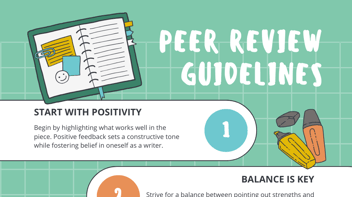by Michael Lydon
“Op-ed pages,” Wikipedia tells me, began in 1921 when a New York newspaper...
Peer review—also known as peer feedback, or peer assessment, in the classroom context—constitutes the process of structured, student-to-student feedback exchanges geared toward the development of a drafted written work.
Through regular practice of peer review, students have the opportunity to ‘re-see’ their writing, as well as the work of others, internalizing craft techniques as they move works through multiple rounds of drafting and revision. This re-seeing transforms the drafting process into one of discovery for learners and instructors as they engage more deeply with the content/topic of the work, as well as the writing style.
Furthermore, the interactivity of peer review presents rich opportunities for social learning in the writing classroom, setting it apart from, say, AI-generated essay feedback (which may help writers with grammar/mechanics checks, or in-the-moment feedback that inform their process in addition to, but not instead of, peer review). By exchanging work, thinking deeply about it, and learning to provide, receive, and act upon constructive feedback, writers are exposed to multiple perspectives and practice social-emotional skills.
These skills are highly transferable—whether providing feedback as a manager in the workplace, or advocating for oneself in a personal or professional setting, the ability to know one’s central message, cater one’s delivery to an intended audience, and provide and remain open to feedback are all essential beyond high school.
-> Read more on how to build peer review guidelines for your classroom.
Social-emotional learning competencies—defined by the Collaborative for Academic, Social, and Emotional Learning (CASEL) as self-awareness, self-management, social awareness, relationship skills, and responsible decision-making (2024)—are critical to students’ success in school, career, and life.
“SEL interventions that addressed the five core competencies increased students’ academic performance by 11 percentile points, compared to students who did not participate” (CASEL, 2023) according to extensive meta-analyses.
What’s more, programs that promote these skills—self-awareness, self-management, social awareness, relationship skills, and responsible decision-making—may also boost students’ mental health and wellbeing, supporting their holistic development.
Peer review requires reflection, promoting self-awareness. Reviewers have to consider their own identities, perspectives, biases, strengths, and areas for improvement in order to fairly and constructively interpret and provide feedback on another writer’s work.
This process is metacognitive, meaning students have to think about their own thinking— connecting their lived experiences to curricular content and considering how the various ecologies and “systems” in which they live—from the “microsystem” of home to the “macrosystem” of social norms (Bronfenbrenner, 1997; Nakkula & Toshalis, 2006)—impact their identity development, and relate to writing and reading.
Scaffolded peer review resources, guides, and rubrics encourage thoughtful engagement with peers’ stories and ideas, necessitating students’ self-management and social awareness in the construction and delivery of substantive feedback that balances encouragement with actionable next steps.
By managing impulses, leveraging self-awareness regarding one’s own positionality and competency, and engaging social awareness through considerations of another’s perspective—which may be quite different from one’ sown—students practice developing their “theory of mind” (ToM), or “ability to attribute mental states to ourselves and others, serving as one of the foundational elements for social interaction” (Ruhl, 2023), anticipating the intended audience of their peer writer and shaping their suggestions so that writer will be receptive to them.
-> Help students build social awareness in a culturally responsive classroom.
Peer review exchanges no doubt require and build relationship skills and the cultural competency, emotional responsiveness, and perspective-taking they involve. Reviewers forge meaningful connections with writers, working alongside them as guides and cheerleaders to steer them toward their goal, their intended audience.
This process necessitates responsible decision-making. Based on the self- and social-awareness noted above, reviewers must make informed decisions about what feedback to share and how to frame it, so the exchange is productive and supportive for both parties. Additionally, classroom activities that leverage reading, writing, and communication skills across disciplines—for example, an inquiry-based lab report in Biology or a primary source analysis in Social Studies—simultaneously require responsible decision-making on the part of students to foster a strong writing community in the classroom.
And publication opportunities, in which students craft writing for an intended, authentic audience in alignment with project-based learning pedagogy, support and solidify SEL competencies through a culminating social exchange that—whether a poetry open mic, bound chapbook of environmental writings, public debate, or mock trial—requires a distillation and combination of all above-stated skills.


Teachers of writing know the importance of audience in motivating a writer, focusing a draft,...
READ MORE
by Michael Lydon
“Op-ed pages,” Wikipedia tells me, began in 1921 when a New York newspaper...

Writing is a social activity, improved through authentic interactions between reader and writer....
READ MORE